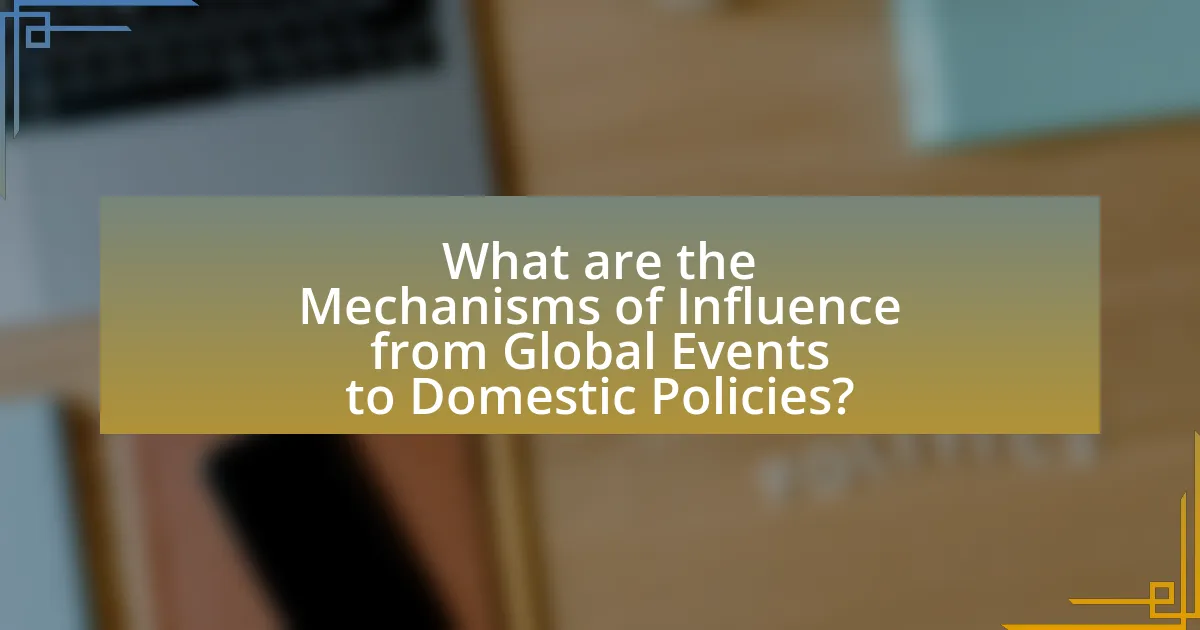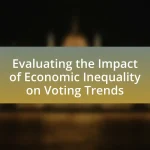The article examines how global events are shaping domestic policies in 2023, highlighting the influence of climate change, geopolitical tensions, and economic instability on national agendas. It discusses specific examples, such as the impact of the COVID-19 pandemic on public health policies, the war in Ukraine prompting shifts towards renewable energy, and economic crises leading to stimulus measures. The article also explores mechanisms of influence, including economic interdependence and social movements, and emphasizes the importance of understanding these connections for effective policy-making and public engagement. Additionally, it outlines current trends and best practices for policymakers to enhance resilience in response to global uncertainties.

How are Global Events Influencing Domestic Policies in 2023?
Global events are significantly influencing domestic policies in 2023 by prompting governments to adapt their strategies in response to international challenges such as climate change, geopolitical tensions, and economic instability. For instance, the ongoing effects of the COVID-19 pandemic have led many countries to prioritize public health infrastructure and emergency preparedness in their domestic agendas. Additionally, the war in Ukraine has caused nations to reassess their energy policies, with many shifting towards renewable energy sources to reduce dependence on foreign oil. This shift is evidenced by the European Union’s commitment to the Green Deal, aiming for carbon neutrality by 2050. Furthermore, global economic pressures, including inflation and supply chain disruptions, have compelled governments to implement policies that support local industries and enhance economic resilience. These adaptations illustrate how interconnected global events are reshaping national priorities and legislative frameworks in 2023.
What types of global events are currently impacting domestic policies?
Current global events impacting domestic policies include climate change, geopolitical tensions, and economic instability. Climate change has prompted governments to implement stricter environmental regulations and invest in renewable energy sources, as seen in the European Union’s Green Deal aimed at reducing carbon emissions by 55% by 2030. Geopolitical tensions, such as the Russia-Ukraine conflict, have led countries to reassess their energy dependencies and defense strategies, influencing policies like increased military spending in NATO member states. Economic instability, exacerbated by the COVID-19 pandemic and supply chain disruptions, has resulted in stimulus packages and inflation control measures, as evidenced by the U.S. Inflation Reduction Act aimed at curbing rising prices while promoting job growth.
How do economic crises shape national policy decisions?
Economic crises significantly influence national policy decisions by prompting governments to implement immediate economic interventions and long-term structural reforms. For instance, during the 2008 financial crisis, many countries adopted stimulus packages and regulatory reforms to stabilize their economies, such as the Dodd-Frank Act in the United States, which aimed to prevent future financial collapses. Additionally, economic downturns often lead to increased public demand for social safety nets, resulting in policies that expand unemployment benefits and healthcare access, as seen in various nations during the COVID-19 pandemic. These responses illustrate how crises can reshape priorities and strategies in governance, reflecting the urgent need to address economic instability and its social repercussions.
What role do international conflicts play in domestic policy formulation?
International conflicts significantly influence domestic policy formulation by prompting governments to adjust their strategies in response to external pressures and security concerns. For instance, the U.S. response to the 9/11 attacks led to the implementation of the Patriot Act, which expanded surveillance and security measures domestically. Similarly, ongoing tensions with countries like Russia and China have driven nations to enhance defense spending and cybersecurity policies. These adjustments reflect a direct correlation between international conflict dynamics and the prioritization of national security and economic stability in domestic agendas.
Why is it important to understand the connection between global events and domestic policies?
Understanding the connection between global events and domestic policies is crucial because it enables governments to respond effectively to international challenges and opportunities. For instance, the COVID-19 pandemic highlighted how global health crises can necessitate immediate domestic policy changes, such as lockdowns and healthcare funding adjustments. Additionally, economic shifts, like the 2008 financial crisis, demonstrated that global market fluctuations can directly impact national economies, prompting governments to implement stimulus packages and regulatory reforms. Recognizing these connections allows policymakers to create informed strategies that address both local needs and global realities, ensuring resilience and adaptability in an interconnected world.
How can this understanding affect public opinion and political discourse?
Understanding how global events shape domestic policies can significantly influence public opinion and political discourse by highlighting the interconnectedness of local and international issues. This awareness can lead to increased public engagement and scrutiny of government actions, as citizens recognize that decisions made in response to global events directly impact their lives. For instance, the COVID-19 pandemic prompted discussions about healthcare policies, revealing how international health crises can drive local policy changes. Additionally, events such as climate change negotiations can shift public sentiment towards environmental policies, as citizens demand accountability from their leaders. This dynamic interaction fosters a more informed electorate, encouraging political discourse that reflects the complexities of global interdependence.
What implications does this have for future policy-making?
Future policy-making will increasingly prioritize adaptability and resilience in response to global events. The interconnectedness of economies and societies means that domestic policies must account for international challenges such as climate change, pandemics, and geopolitical tensions. For instance, the COVID-19 pandemic highlighted the need for robust public health systems and emergency preparedness, prompting governments to revise health policies and allocate resources accordingly. Additionally, the rise of digital technology and remote work has led to policy shifts in labor regulations and economic support systems, as seen in various countries implementing new frameworks to support gig workers. These examples demonstrate that future policies will need to be dynamic and responsive to both local and global contexts to effectively address emerging challenges.

What are the Mechanisms of Influence from Global Events to Domestic Policies?
Global events influence domestic policies through mechanisms such as economic interdependence, political pressure, and social movements. Economic interdependence occurs when global market fluctuations, such as trade agreements or financial crises, compel governments to adjust their domestic economic policies to maintain competitiveness or stability. For instance, the 2008 financial crisis led many countries to implement regulatory reforms in their banking sectors to prevent future collapses.
Political pressure arises from international organizations and foreign governments advocating for specific policy changes, often linked to human rights or environmental standards. An example is the influence of the Paris Agreement on climate policies, where countries are pressured to adopt greener practices to meet international commitments.
Social movements can also be catalyzed by global events, as seen with the #MeToo movement, which gained traction worldwide and prompted many nations to reevaluate and reform their domestic laws regarding sexual harassment and gender equality. These mechanisms demonstrate how interconnected global dynamics can shape national policy decisions.
How do governments respond to global economic changes?
Governments respond to global economic changes by implementing fiscal and monetary policies aimed at stabilizing their economies. For instance, during the 2008 financial crisis, many governments increased public spending and lowered interest rates to stimulate economic growth. Additionally, in response to the COVID-19 pandemic, countries like the United States enacted stimulus packages, such as the CARES Act, which allocated over $2 trillion to support individuals and businesses. These actions demonstrate how governments adapt their policies to mitigate the impacts of global economic shifts and maintain economic stability.
What strategies are employed to mitigate the effects of global inflation?
Central banks employ monetary policy adjustments, such as raising interest rates, to mitigate the effects of global inflation. By increasing interest rates, central banks aim to reduce consumer spending and borrowing, which can help lower demand and stabilize prices. For instance, the Federal Reserve raised interest rates multiple times in 2022 and 2023 to combat rising inflation rates, which reached levels not seen in decades. Additionally, governments may implement fiscal policies, such as targeted subsidies or tax relief, to alleviate the burden on consumers and businesses affected by inflation. These strategies are designed to balance economic growth while controlling inflationary pressures.
How do trade agreements influence domestic regulatory frameworks?
Trade agreements significantly influence domestic regulatory frameworks by establishing binding commitments that require countries to align their laws and regulations with international standards. For instance, agreements like the North American Free Trade Agreement (NAFTA) necessitated changes in labor, environmental, and trade regulations in member countries to facilitate smoother trade and investment flows. These agreements often include provisions that promote regulatory coherence, which can lead to the harmonization of standards across borders, thereby affecting domestic policies in areas such as product safety, intellectual property rights, and labor laws. The World Trade Organization (WTO) agreements exemplify this influence, as they compel member states to modify their domestic regulations to comply with trade rules, ensuring that trade barriers are minimized and that there is a level playing field for international competition.
In what ways do social movements abroad affect local policy agendas?
Social movements abroad influence local policy agendas through transnational advocacy, the diffusion of ideas, and the mobilization of local activists. Transnational advocacy networks, such as those seen in climate change or human rights movements, create pressure on local governments to adopt similar policies by highlighting global standards and practices. For example, the global #MeToo movement has prompted local legislative changes regarding sexual harassment laws in various countries, demonstrating how international movements can catalyze local policy reform. Additionally, the diffusion of ideas occurs as local policymakers observe successful strategies from abroad, leading to the adoption of similar policies. The Black Lives Matter movement in the United States has inspired protests and policy discussions in other countries, influencing local agendas on racial justice and police reform. Lastly, local activists often draw inspiration from international movements, leveraging global solidarity to advocate for change within their own contexts, thereby reshaping local policy priorities.
How can international human rights issues lead to domestic reforms?
International human rights issues can lead to domestic reforms by influencing public opinion and prompting governmental accountability. When international bodies, such as the United Nations, highlight human rights violations, they create pressure on domestic governments to address these issues. For instance, the Universal Periodic Review process by the UN has led countries like Tunisia to implement reforms in their legal frameworks to enhance civil liberties following international scrutiny. Additionally, global human rights campaigns can mobilize civil society, leading to grassroots movements that demand change, as seen in the global response to police brutality, which has spurred reforms in law enforcement practices in various countries.
What examples illustrate the impact of global social movements on local legislation?
Global social movements have significantly influenced local legislation, with notable examples including the Black Lives Matter movement and the global climate strikes. The Black Lives Matter movement, which gained momentum after the 2020 protests, led to legislative changes in various U.S. cities, such as the banning of chokeholds and the implementation of police reform measures in places like Minneapolis. Similarly, the global climate strikes, inspired by activists like Greta Thunberg, have prompted local governments worldwide to adopt stricter environmental regulations, such as the declaration of climate emergencies in cities like New York and London. These movements demonstrate how collective action on a global scale can drive local legislative changes, reflecting the interconnectedness of social issues.

What are the Current Trends in Domestic Policy Shaped by Global Events?
Current trends in domestic policy are increasingly influenced by global events such as climate change, geopolitical tensions, and economic shifts. For instance, many countries are adopting stricter environmental regulations and investing in renewable energy sources in response to the global climate crisis, as evidenced by the commitments made during the 2021 COP26 summit. Additionally, the ongoing geopolitical tensions, particularly related to Russia’s invasion of Ukraine, have led nations to reassess their energy independence and security policies, prompting increased military spending and strategic alliances. Economic disruptions caused by the COVID-19 pandemic have also resulted in domestic policies focusing on public health infrastructure and economic recovery measures, with governments implementing stimulus packages and support for vulnerable populations. These trends demonstrate a clear linkage between global events and the evolution of domestic policy frameworks.
How is climate change influencing domestic policy in various countries?
Climate change is significantly influencing domestic policy in various countries by prompting governments to implement stricter environmental regulations and promote sustainable practices. For instance, the European Union has introduced the European Green Deal, aiming for carbon neutrality by 2050, which includes policies to reduce greenhouse gas emissions and enhance renewable energy sources. Similarly, the United States has rejoined the Paris Agreement and is focusing on infrastructure investments that prioritize climate resilience and clean energy. In developing nations, such as India, climate change has led to policies that encourage solar energy adoption and improve water management systems to combat droughts. These actions reflect a global recognition of climate change as a critical factor in shaping national agendas and legislative frameworks.
What specific policies are being enacted in response to global climate agreements?
Countries are enacting specific policies such as carbon pricing, renewable energy mandates, and emissions reduction targets in response to global climate agreements. For instance, the European Union has implemented the European Green Deal, which aims to make Europe the first climate-neutral continent by 2050, including a commitment to reduce greenhouse gas emissions by at least 55% by 2030 compared to 1990 levels. Additionally, the United States has rejoined the Paris Agreement and set a target to cut emissions by 50-52% by 2030, alongside investments in clean energy infrastructure through initiatives like the Inflation Reduction Act. These policies reflect a commitment to align national strategies with international climate goals, demonstrating a direct response to the frameworks established by global climate agreements.
How do natural disasters drive changes in local governance and infrastructure policy?
Natural disasters drive changes in local governance and infrastructure policy by highlighting vulnerabilities and necessitating immediate responses to protect communities. For instance, after Hurricane Katrina in 2005, New Orleans implemented significant reforms in emergency management and urban planning to enhance resilience against future disasters. These reforms included stricter building codes and improved evacuation plans, demonstrating a direct correlation between disaster experiences and policy adaptations. Additionally, research from the National Academy of Sciences indicates that regions affected by severe weather events often see increased funding for infrastructure improvements, reflecting a shift in governance priorities towards disaster preparedness and risk mitigation.
What role does technology play in shaping domestic policies influenced by global events?
Technology plays a crucial role in shaping domestic policies influenced by global events by facilitating communication, data analysis, and public engagement. For instance, during the COVID-19 pandemic, governments utilized technology to implement contact tracing apps and disseminate health information rapidly, which directly influenced public health policies. Additionally, social media platforms have enabled citizens to mobilize and advocate for policy changes in response to global movements, such as climate change activism, thereby impacting domestic legislation. The integration of big data analytics allows policymakers to assess global trends and adapt domestic strategies accordingly, ensuring that national policies remain relevant and effective in a rapidly changing global landscape.
How are cybersecurity threats prompting changes in national security policies?
Cybersecurity threats are prompting changes in national security policies by necessitating a shift towards more proactive and comprehensive defense strategies. Governments are increasingly recognizing that traditional security measures are insufficient to address the evolving nature of cyber threats, which can disrupt critical infrastructure, steal sensitive data, and undermine public trust. For instance, the U.S. Cybersecurity and Infrastructure Security Agency (CISA) has emphasized the need for enhanced collaboration between public and private sectors to bolster cybersecurity resilience. This shift is reflected in legislative actions, such as the Cybersecurity Information Sharing Act, which encourages information sharing about cyber threats among organizations to improve collective defense. Additionally, nations are investing in advanced technologies and workforce development to better prepare for and respond to cyber incidents, illustrating a fundamental transformation in how national security is conceptualized in the digital age.
What impact does global digital transformation have on local regulatory practices?
Global digital transformation significantly influences local regulatory practices by necessitating updates to existing laws and the creation of new regulations that address emerging technologies. As businesses adopt digital tools and platforms, local governments must adapt their regulatory frameworks to ensure consumer protection, data privacy, and cybersecurity. For instance, the implementation of the General Data Protection Regulation (GDPR) in the European Union has prompted many countries worldwide to revise their data protection laws to align with these standards, demonstrating a direct impact of global digital trends on local legislation. Additionally, the rise of e-commerce has led to local authorities reevaluating tax regulations and compliance measures to capture revenue from online transactions, further illustrating how global digital shifts compel local regulatory adaptations.
What best practices can policymakers adopt to effectively respond to global events?
Policymakers can adopt best practices such as proactive engagement, data-driven decision-making, and international collaboration to effectively respond to global events. Proactive engagement involves anticipating potential global challenges and preparing responses in advance, which can mitigate risks and enhance resilience. Data-driven decision-making ensures that policies are based on accurate and relevant information, allowing for timely and effective responses; for instance, during the COVID-19 pandemic, countries that utilized real-time data for contact tracing and resource allocation were more successful in managing outbreaks. International collaboration is crucial, as global events often transcend borders; for example, the Paris Agreement on climate change exemplifies how countries can work together to address shared challenges. These practices collectively enhance the ability of policymakers to navigate complex global landscapes and implement effective domestic policies.
How can collaboration with international organizations enhance domestic policy effectiveness?
Collaboration with international organizations can enhance domestic policy effectiveness by providing access to best practices, technical expertise, and funding. For instance, countries that partner with organizations like the World Bank or the United Nations often receive guidance on policy formulation based on successful models implemented elsewhere. This collaboration can lead to improved governance and more efficient resource allocation. Additionally, international organizations can facilitate knowledge sharing and capacity building, which are crucial for addressing complex issues such as climate change or public health crises. Evidence of this can be seen in the Global Fund’s work in combating HIV/AIDS, tuberculosis, and malaria, where collaborative efforts have resulted in significant reductions in disease prevalence in participating countries.
What strategies can be implemented to ensure resilience in policy-making amidst global uncertainties?
To ensure resilience in policy-making amidst global uncertainties, adaptive governance frameworks should be implemented. These frameworks allow for flexibility and responsiveness to changing circumstances, enabling policymakers to adjust strategies based on real-time data and emerging trends. For instance, the COVID-19 pandemic highlighted the need for rapid policy adjustments, demonstrating that countries with established adaptive governance structures, such as New Zealand, were able to respond more effectively to the crisis. Additionally, incorporating stakeholder engagement into the policy-making process fosters collaboration and diverse perspectives, which can enhance the robustness of decisions made under uncertainty. Research from the World Economic Forum indicates that inclusive policy-making leads to more sustainable and resilient outcomes, as it considers a wider range of impacts and solutions.


